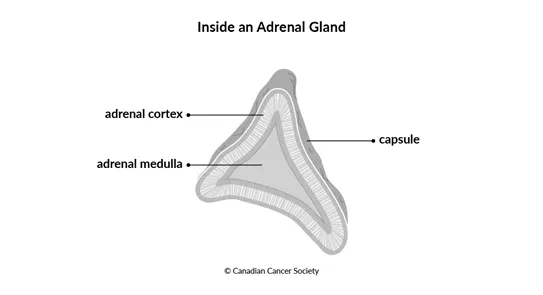Adrenal gland hormones
As part of the endocrine system, the adrenal glands produce hormones. Hormones are
substances that control specific body functions, such as

Adrenal cortex hormones
The adrenal cortex produces several hormones. The most important are aldosterone (a mineralocorticoid), cortisol (a glucocorticoid), and androgens and estrogen (sex hormones).
Aldosterone helps the kidneys control the amount of salt in the blood and tissues of the body to help regulate blood pressure.
Cortisol helps the body manage and use carbohydrates, protein and fat. It also causes changes in metabolism to help the body manage stress, and it suppresses the immune system.
Androgens
are male sex hormones. The adrenal glands of both men and women make androgens,
but in different amounts. Androgens help the organs of the
Estrogen is a female sex hormone. It controls female reproduction and sexual development, including the development of female characteristics such as the growth of breasts.
The adrenal cortex is made up of inner, middle and outer layers.
Aldosterone is produced in the outer layer.
Cortisol is produced in the middle layer.
Androgens and estrogen are produced in the inner layer.
Adrenal medulla hormones
The hormones produced by the adrenal medulla are called catecholamines. They act as hormones and as chemical messengers in the nervous system (called neurotransmitters). They manage the body's response to stress. The 2 important catecholamines are epinephrine and norepinephrine.
Epinephrine (adrenaline) is released during times of short-term stress such as sudden shock or fear. It increases your heart rate, blood pressure and blood sugar level.
Norepinephrine (noradrenaline) constricts blood vessels. Like epinephrine, it increases your heart rate, blood pressure and blood sugar level.
The adrenal medulla also produces the protein chromogranin A, which is stored and secreted with epinephrine and norepinephrine.
Your trusted source for accurate cancer information
With support from readers like you, we can continue to provide the highest quality cancer information for over 100 types of cancer.
We’re here to ensure easy access to accurate cancer information for you and the millions of people who visit this website every year. But we can’t do it alone.
Every donation helps fund reliable cancer information, compassionate support services and the most promising research. Please give today because every contribution counts. Thank you.
